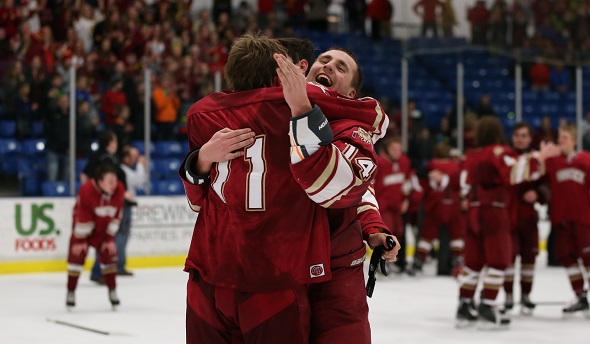
Hancock Finishes Long Trip as Champion
April 14, 2016
By Geoff Kimmerly
Second Half editor
As the Hancock hockey team bus rolled into town to end last month’s Division 3 championship run, coach Dan Rouleau warned his players that the celebration was just getting started.
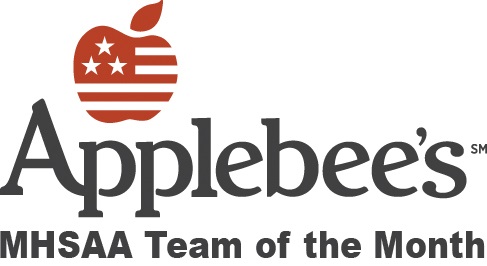 “I told these kids on the bus coming home, they were going to be rock stars over the next month,” he recalled Thursday. “And they certainly are.”
“I told these kids on the bus coming home, they were going to be rock stars over the next month,” he recalled Thursday. “And they certainly are.”
That’ll happen when a hockey-crazed community earns its first MHSAA title since 1999, along the way beating 17-time champion Bloomfield Hills Cranbrook Kingswood 2-1 in overtime in the Semifinal and four-time finalist Grand Rapids Catholic Central 4-2 in the championship game.
And despite the Bulldogs’ No. 2 ranking heading into the postseason, the run was made all the more incredible considering Hancock, with 262 students, had the lowest enrollment of among hockey schools in Michigan this winter and was paced by two underclassmen leading scorers and a sophomore goaltender.
“I told the guys before the season started that we’ve got a chance to do something special. I really felt like we had the chance to do this,” said Rouleau, who was an assistant for the 1999 team that won the Class B-C-D title. “When we were looking at who was coming back for the other teams, when we got to the Quarterfinals we told (our team) there are seven teams that could beat you guys, and seven that you could beat. It was that close.”
The Bulldogs are the Applebee’s Team of the Month for March after finishing the run as the best of that final eight, but also with a school-record 24 wins to go with only six losses – four decided in overtime and the other two by only one goal apiece.
Seniors Jack Fenton and Dylan Paavola made the Division 3 all-state first and seconds teams, respectively, bringing a veteran presence to the group of blueliners. But behind them, all-state goalie Dawson Kero was only a sophomore. Sophomore right wing Teddy Rendell was the team’s leading scorer with 24 goals and 36 assists, making the all-state first team, and freshman left wing Alex Nordstrom made the second team with 33 goals and 26 assists. (They were centered by senior Danny Hill, who joined Fenton and Paavola as captains.)
But on-ice dominance was only part of what made Hancock’s run so memorable. Here’s some of the rest:
Hancock, just over the Portage Lake Bridge on the Upper Peninsula’s Keweenaw Peninsula, is one of Michigan’s northernmost towns – and located 540 miles from USA Hockey Arena in Plymouth, home of the MHSAA Finals. Hancock also is 100 miles from Marquette, where it faced Sault Ste. Marie in a Quarterfinal on March 9, two days before it would take on the Cranes in their Semifinal.
First-year athletic director Steve Aho knew if his team won Tuesday in Marquette, it wouldn’t return home but would keep going all the way to Plymouth – so he was charged with planning for a potential five days of hotels, transportation, meals and more. He also started on plans for a fan bus that would bring students to the championship game if Hancock won the Semifinal that Thursday.
Neither trip would come cheap, of course. But that’s where Hancock’s wide-reaching web of supporters stepped in.
Teams making the long trip downstate frequently fund-raise to offset costs, Aho said. In this case the Bulldogs decided to try a GoFundMe crowd-funding web page, asking for $6,000 to combine with what the MHSAA gives teams for travel.
Aho had the team’s seniors write their story before the Quarterfinal, so the request would be in their voice and from their perspective. He published it immediately after the Bulldogs beat Sault Ste. Marie – and by Wednesday, $3,000 had been raised with funds coming in from alumni spread all over the Midwest and beyond. Within two days, the $6,000 was raised, which when combined with funds from the MHSAA paid for the trip.
 Rouleau said as the bus traveled south, his players watched the donations come in on their phones – and also the inspirational messages left by alums, including the Chicago Blackhawks’ Tanner Kero. “These guys knew they were involved in something special at that point,” Rouleau said.
Rouleau said as the bus traveled south, his players watched the donations come in on their phones – and also the inspirational messages left by alums, including the Chicago Blackhawks’ Tanner Kero. “These guys knew they were involved in something special at that point,” Rouleau said.
Meanwhile, the school’s athletic boosters paid for most of a fan bus that was filled with 51 (for 53 seats) who made the trip to root on the Bulldogs – then got right back on the bus for the long trip home.
But what a trip back it was for the team. A Marquette County Sheriff’s deputy escorted the bus through that county, then passing the Bulldogs off to a Baraga County deputy. From Munising homeward (about 150 miles) the parade continued to grow until it swelled to roughly 40 rescue vehicles followed by fan vehicles for another mile (see the long line arriving in town on the video below).
It was a trip none of the players or coaches will forget. Rouleau had enjoyed the 1999 championship with his son and nephew on the team, but this run certainly rivals if not surpasses the first – not only is Rouleau now the head coach, but he also was diagnosed with Parkinson’s Disease six years ago and was hoping he’d have another opportunity to take a team downstate before his health would make him step down.
With the players Hancock should bring back next season, his team's next trip to Plymouth might come after a much shorter wait.
Past Teams of the Month, 2015-16:
February: Petoskey boys skiing – Report
January: Spring Lake boys swimming & diving – Report
December: Saginaw Heritage girls basketball – Report
November: Ann Arbor Gabriel Richard volleyball – Report
October: Benton Harbor football – Report
September: Mason and Okemos boys soccer – Report
PHOTOS: (Top) Hancock players celebrate after their Division 3 Final win over Grand Rapids Catholic Central last month. (Middle) The Bulldogs turn to salute fans who also made the 500-mile trip to USA Hockey Arena.
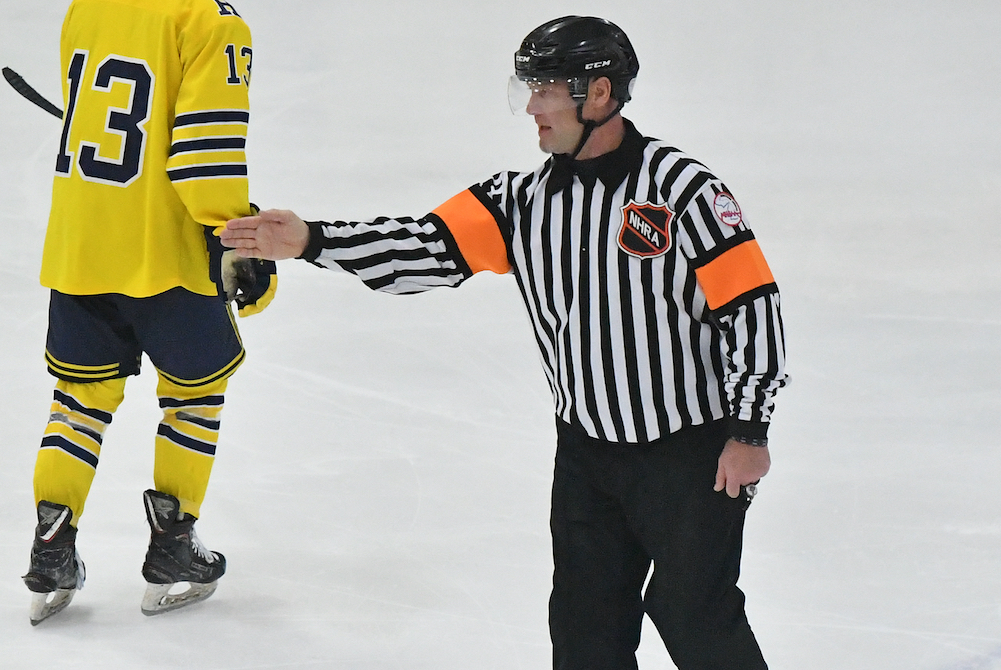
Retired NHL-er Back on Ice to Answer Call - By Making Them
By
Rob Kaminski
MHSAA benchmarks editor
March 16, 2023
The most accomplished skater on the ice during Friday’s triple-overtime MHSAA Division 1 Semifinal hockey thriller between Hartland and Brighton was not wearing the school colors of either team.
In front of a packed house at Plymouth’s USA Hockey Arena, referee Bryan Smolinski was in stripes, just like the rest of his officiating crew.
In his former life, he pulled on plenty of sweaters before lacing up the skates. That happens when one logs more than 1,000 games, tallies nearly 300 goals (274) and close to 400 assists (377) with eight teams spanning a 15-year playing career in the National Hockey League.
So, how did the 52-year-old former star player find himself on the ice last weekend as one of the referees for the pinnacle weekend of this high school season? Good question, even for the man known as “Smoke” during his playing days.
“I was working in youth development programs a few years back and reached out to some Michigan guys I had connections with about other ways to help the game,” Smolinski said. “I called Kevin May just to chat and asked, ‘Hey, how’s your reffing going?’ He said, ‘You know, we’re down a little bit,’ then said, ‘Why don’t you do it?’ I said, ‘Not a chance,’” Smolinski laughed.
Never Say Never
May persisted, imploring his friend to skate with him during a Fall league at Cranbrook in Bloomfield Hills. After eight weeks, once a week, Smolinski had a revelation.
“I’m like, ‘I’m kind of diggin’ this,’” Smolinski said “So, I did all the testing, and the educational part of it, and I really enjoyed it. I got with Danny (DiCristofaro) and his group, and he put me in as much as he could, and I really started to get my feet wet.”
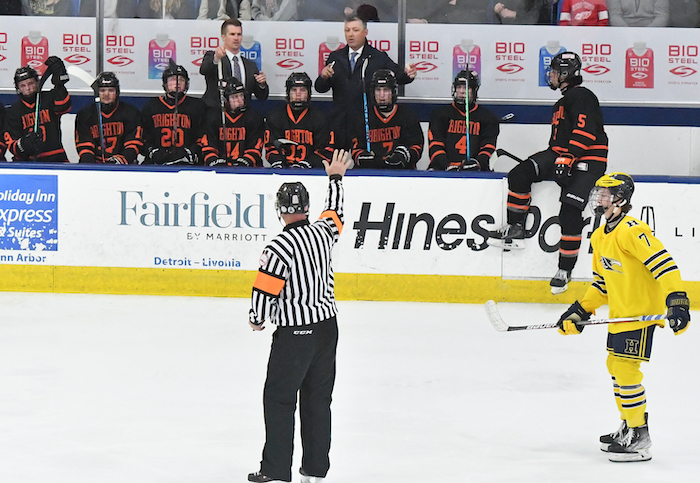 DiCristofaro is the assigner and referee-in-chief for the MHSAA’s Northeast Hockey Referees Association, and he has seen Smolinski’s growth first-hand.
DiCristofaro is the assigner and referee-in-chief for the MHSAA’s Northeast Hockey Referees Association, and he has seen Smolinski’s growth first-hand.
“Obviously he’s got great instincts and a feel for the game, along with a wealth of experience, all of which has allowed him to climb the ladder quickly,” said DiCristofaro. “It’s been a joy to watch his growth as an official.”
Fast forward to last Friday, and there were Smolinski and May sharing duties as referees during the MHSAA Semifinal with linesmen Michael Andrews and Thomas Robbins.
In between, there has been a learning curve that still continues, but the jump to officiating was not quite as daunting as his introduction to the NHL.
“I was scared to death. My first game was against Mario Lemieux. I’m in the old Boston Garden and now I’m playing against these guys and it’s their job, and they’re out there trying to make a living,” Smolinski recalled.
The emotions were not running nearly as frenzied for his first game as an MHSAA official, obviously, yet respect came in a different form.
“I couldn’t pick the puck up, I was breathing heavily; it was Kevin and me doing a two-man game in Brighton,” Smolinski recalled. “There were a few high-end kids playing, and I’m thinking, ‘I’m dying here.’ You know, there’s no training for that first time.”
What that experience did, however, was revitalize Smolinski in a new way. His playing career is well documented, not only in the NHL, but around Michigan. He enjoyed an honor-laden career at Michigan State University from 1989-93 before joining the Boston Bruins (who had drafted him three years earlier) at the end of the ’93 NHL campaign. Even after his final season, with Montreal in 2007-08, he stayed in the game via men’s leagues, or coaching his son, Max.
Smolinski and his wife, Julie, have three daughters: Ashtyn (22), Jojo (16) and Rylen (12), along with Max, whom dad coached for seven years including during a national championship run with a Little Caesars U15 team in 2019. Max, 19, is now playing collegiately at Rensselaer Polytechnic Institute.
So, for Smolinski, officiating offers a new chapter.
“Reffing brought back ... I wouldn’t say love of the game, because that’s always been there; it’s a different side of enjoying the game now. I have no horse in the race, my son’s off to college, my daughters are doing their thing; I wanted to find something new in the game,” Smolinski said. “I’ve coached, and I don’t want to do that. I found this, and I’ve stuck with it.”
Old College Ties
One of the great benefits of athletics at any level are the friendships made. For two kids who met in their first years on the MSU campus and forged a bond that lasts to this day, it’s amazing how their careers reached the pinnacle and have now come full circle.
Wes McCauley, an MSU teammate, is one of Smolinski’s best friends. After numerous years in the minor leagues, McCauley, like his friend, made it to the NHL. But McCauley made it as an official, working his first NHL game in 2003, when Smolinski was nearing the end of his playing career.
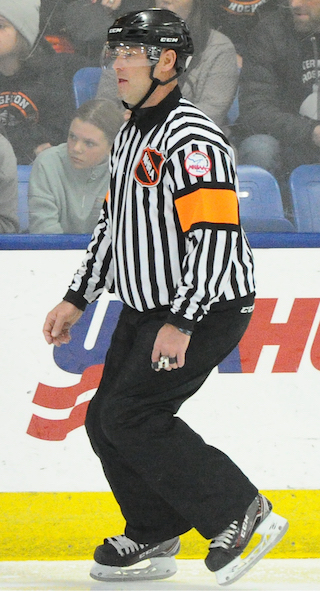 Their games lined up on just a few occasions in the NHL, and the two lobbied hard to have McCauley work Smolinski’s 1,000th career game in his final season with the Canadiens in 2007-08. The request, sadly, was denied by the league.
Their games lined up on just a few occasions in the NHL, and the two lobbied hard to have McCauley work Smolinski’s 1,000th career game in his final season with the Canadiens in 2007-08. The request, sadly, was denied by the league.
On the rare occasions when the friends did share the same ice, less than a handful by Smolinski’s count, it was McCauley who was forced to rebuff any attempts at fraternization. It’s just part of an official’s edict.
“For both of us, it was amazing; it was just great,” Smolinski said. “I’d say, ‘Hey man what’s up?’ and he says, ‘Can’t talk.’ I’m like, ‘What do you mean, we talk all the time.’ Again, he’s like, ‘Can’t talk, get away from me.’ You know, it was just business.”
McCauley then reached the 1,000-game plateau himself in 2018 and is still going strong as a regular selection for playoff duties with nine Stanley Cup Finals assignments, including last year.
So, it should have been natural for Smolinski to go to his old friend immediately for officiating pointers once he joined the ranks, right? Well, maybe not immediately.
“I talk to Wes all the time, but I actually hid it from him right out of the gate because I didn’t want to take his razzing. Eventually it got out, and he was loving it. He started sending me whistles and visors and pants,” Smolinski said, grinning. “And none of it fit, you know, because I’m older and fatter, and he’s so damn skinny. So, I still had to go out and get all new gear.”
Both Sides Now
Having been to the top of his profession, now moving to the other side of that same mountain that his friend McCauley scaled, the respect has grown for those blowing the whistle.
“The preparation for officiating is much more mental,” Smolinski said. “Way more rules oriented. You’re always trying to get away with things that you can as a player; now you have to police that.”
Smolinski has a distinct advantage.
“I know everything they’re trying to do because I’ve done it. I know where you’re going with the puck, I know what kind of breakout you’re trying to do,” Smolinski said. “I have all the instincts, now I just try to stay out of the way and not ruin their game. The most fun is watching the game develop and the ups and downs. For me to be out there and enjoy it with them, that’s the fun part.”
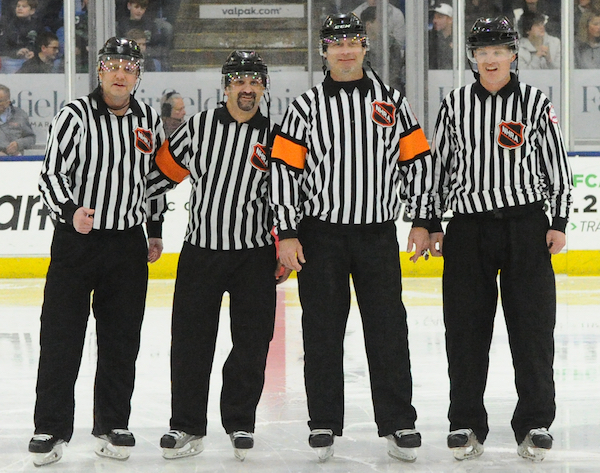 Those who have played hockey at any level have a built-in advantage should they consider the officiating avocation: the ability to skate. Unlike officiating in any other sport, skating is a prerequisite. This makes the pool limited, and almost solely composed of former players. Smolinski offers this advice.
Those who have played hockey at any level have a built-in advantage should they consider the officiating avocation: the ability to skate. Unlike officiating in any other sport, skating is a prerequisite. This makes the pool limited, and almost solely composed of former players. Smolinski offers this advice.
“I prefer sticking with high school because I think there’s more decorum, more administrative structure. Kids are playing for their schools, there’s loyalty there,” said Smolinski. “And there is more accountability. People need report to athletic directors and supervisors. Other levels can be more loosely governed, or a bit more maverick in nature. Moms and dads get involved more, coaches maybe know a little less,” said Smolinski.
He has, in fact, worked a handful of non-school games, and there’s a stark difference.
“I wanted to see what was going on, and I see it first-hand,” Smolinski said. “There are some crazy people and parents out there, and these guys are getting absolutely tortured. I’ve been tortured. There has to be a level of respect for what officials do. I think schools can rein that in a little more. All the guys I’ve met give up a lot of time and work hard because they love to do it and love the game.”
All sports need an assist from school administration and from those who once played the games to keep the officials recruitment moving in the right direction. People like Smolinski can help.
“He clearly doesn’t need to do this, and that’s what makes it so fantastic,” DiCristofaro said. “We need more people who have played – at any level – to do what he’s done and stay in the game as officials.”
Smolinski continues to promote the game in other ways as well. Currently, he is involved in the NHL’s Learn To Play initiative, which aims to inspire youth and welcome more families into the hockey community.
“We work hand-in-hand with the NHL Players Association for player development and industry growth,” Smolinski said. “Ages 5 to 9 are introduced to hockey, get head-to-toe gear and instruction, and meet some former players.”
The idea is to have fun first, which can translate into years and maybe even a lifetime in the sport. It’s a lifetime that has given Smolinski so much and continues to do so as he watches it unfold for others from his new vantage point.
PHOTOS (Top) MHSAA official Bryan Smolinski signals during Friday's Division 1 Semifinal between Brighton and Hartland. (2) Smolinski, a retired NHL standout, communicates with the Bulldogs' bench. (3) Smolinski keeps watch during game play. (4) Smolinski, third from left, with his crew: Michael Andrews, Kevin May and Thomas Robbins.

